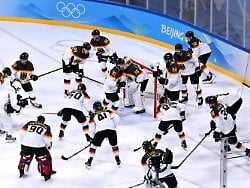China retort as a DEB booster?
Germany must not lose this game
By Tobias Nordman
02/11/2022, 8:20 p.m
After the officially botched German Olympics opener, a win against Kunlun Red Star is a must. The club team will compete in Beijing with 16 North Americans representing China in ice hockey. For the team of national coach Toni Söderholm, a win is an absolute must.
In the German national ice hockey team, they console themselves with the memory. Four years ago, at the successful Olympic tournament in Pyeongchang, the opening game (and also the following one) was lost. So stay calm and breathe easy. Don’t overrate the slap in the face against Team Canada at the start of the tournament in Beijing. This can be a good but also a dangerous consolation. Because the surprising (because it was so violent) 1:5 against the Canadians seemed much less likely than the 2:5 against the Finns back then. But the truth is, nothing has happened yet.
That would change abruptly with another deja vu. Because a second defeat, like in 2018, would very likely mean the end of all medal dreams. Especially if this defeat against China would be conceded. Despite the 17 naturalized professionals – 13 Canadians, three Americans and one native Russian – the host’s team is not really competitive. In the 0:8 at the start against the US boys, the pucks just flew around the ears of the club team Kunlun Red Star (all national players of China are under contract there). The result was the best news for the “hosts”.
They had actually hoped to at least be able to defend themselves with the team from the KHL, the second strongest league in the world (where Kunlun is a distant last). The national embarrassment of double-digit clapping in a row, it was damn big. And apparently it’s still real. The young Americans have impressively indicated that. Is the DEB team also capable of dominating the Chinese in this way? Nobody knows. But what you do know: a lot, a lot has to improve in the second group game to underpin the claim of being a medal candidate.
Boost all
In defense, the Germans let themselves be played far too easily, sometimes lacking physical toughness and a compact formation in their own zone. Far too few chances were created in attack. And also in goal, it absolutely needs an increase. Mathias Niederberger, who surpassed himself as the “Grevenbroich octopus” at last year’s World Cup, didn’t always appear confident.
Despite the early setback, which came at the right time given all the talk about a possible gold medal in China, the team does not want to let the joy of the next Olympic adventure be taken away. “We’ve all been in the ice hockey business for so long that we know that a bad mood doesn’t help,” says attacker Matthias Plachta – one of ten silver winners from 2018 in the selection of national coach Toni Söderholm. “We’re a group that has a lot of fun together.” His view of the duel with China this Saturday is a little funny, rather ironic (from 9.40 a.m. on ZDF and in the live ticker on ntv.de). “That’s a nation we can beat.” Well, the truth is more like this: That’s a nation that Germany has to beat. Anything else would be an embarrassment. Despite all the naturalized exporters.
What about China’s rules?
In the country with the otherwise strict naturalization formalities, people probably didn’t take their eligibility to play very seriously. It actually forbids dual citizenship. But it’s just as the players themselves reveal: “I still have my US passport,” says Jieke Kailiaosi, whose real name is Jake Chelios and is the son of legendary NHL defender Chris Chelios. “I’m definitely not Chinese, but I’ve been playing for a Chinese team for three years, got the chance to live here and I love it.” At least nine Chinese-born players keep up appearances a bit.
How the procedure (according to the world association rules, by the way, this is legitimate) is received by the other teams? “The Olympics always have a touch of the exotic,” said Söderholm diplomatically. After the clap against Canada, the Finn was more concerned with getting his boys back on their feet than worrying about the sense or nonsense of the Chinese team. “It’s important that we learn efficiency,” he warned, “how straightforward we actually have to play.” And he decided: “We also need one or the other qualitatively better pass.”
In training, the national coach took his players aside one by one. With many shots, some of them on empty goals, self-confidence should also be revived. The coach stacked five pucks on top of each other in front of the attacking thirds and let the red half of the team compete against the black half. If you didn’t hit, you had to put the disc back on the stack. Black first sunk all the pucks in the goal – and cheered loudly. “Toni always has a few things up his sleeve that are fun and lighten the mood,” said Plachta. And the quick recovery apparently worked. “We know,” said Patrick Hager, another silver boy from South Korea, “that we can beat any opponent here. We need 60 minutes of top ice hockey for that. But I’m not worried about that.”
